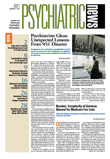Federal officials announced the availability of grants in late July to help states make “innovative” reforms to their Medicaid programs, prompting concerns about the impact of some of those reforms on people with mental illness.
The grants, and the changes they aim to spur, are part of ongoing efforts to rein in Medicaid spending growth while enabling states to adopt innovative methods to improve service effectiveness and efficiency and do “more to help people get the kind of care they prefer,” according to a statement by the Centers for Medicare and Medicaid Services (CMS). The funds were authorized by the Deficit Reduction Act of 2005 (DRA) under the Medicaid Transformation Grant program.
Two states—West Virginia and kentucky—have already implemented reforms approved by CMS that exemplify the goals of the new grant program, although those states did not receive additional funds to implement the changes.
West Virginia's Medicaid redesign included a choice of two benefit packages: a basic plan based on the current Medicaid service package and an enhanced plan for those who sign and adhere to a compliance agreement, which includes benefits not traditionally offered under Medicaid. In a major change from the previous Medicaid program, the new plan limits access for most adults to chemical dependency and mental health services to those who choose the enhanced package. Access to those services is based on compliance factors such as taking medication as directed and keeping all medical appointments.
Selby Jacobs, M.D., chair of the APA Committee on Funding for Psychiatric Services, said the program raises concerns because the illnesses of many people with mental disorders may cause them to refuse to agree to such a plan, or they are too disorganized to comply with it.
The kentucky-redesigned Medicaid program, called ky-Health Choices, offered various benefit packages aimed at meeting the needs of the general Medicaid population, as well as populations such as children, the elderly, and people with disabilities who need institutional care.
Sheila Schuster, Ph.D., executive director of the kentucky Mental Health Coalition, said Medicaid participants with mental illness will be most impacted by the program's institution of medication copayments. She noted, however, that the copayments of up to $3 are significantly less than the $15 copayments that state officials initially proposed and allowed by the DRA.
Federal officials said that the grants will give states the flexibility to try out changes to their plans that may have higher short-term implementation costs than their current Medicaid programs. But they emphasized that the changes are meant to “streamline and modernize their systems, stabilize the growth of the program, and protect it into the future,” according to Mark McClellan, M.D., Ph.D., CMS administrator.
The changes are meant to use funds in states' Medicaid programs more efficiently. Medicaid budgets have grown precipitously in recent years and threatened to consume state budgets. Kentucky's Medicaid deficit reached $675 million by July 1, 2005, and the new plan should save the state about $120 million in the first year and $1 billion over seven years, according to kentucky health officials.
CMS officials reported that changes in recent years had already lowered Medicaid's spending projections nationwide for 2006 through 2015 by $224 billion, or 8 percent, from earlier estimates.
As part of the grant program, federal health officials have encouraged states to consider particular areas “for improved efficiency,” including increased use of health care information technology, stepped up fraud-fighting efforts, and reduced Medicaid expenditures for covered outpatient medications.
The last category raised concerns for Jacobs because Medicaid patients with severe and persistent mental illness are among the biggest users of outpatient medications. No states have yet announced plans to limit patient access or choices for psychiatric medications, but Jacobs is concerned that future Medicaid overhaul proposals may include such a measure.
Ten more states have applied for CMS approval of Medicaid program changes that would also mandate cost sharing or allow benefit cutting, according to the National Health Law Program (NHLP), a nonprofit patient advocacy group.
No state matching funds are required for the grants. The deadline for applications is September 15.
More information on the grants is posted at<www.cms.hhs.gov/MedicaidTransGrants>.▪
